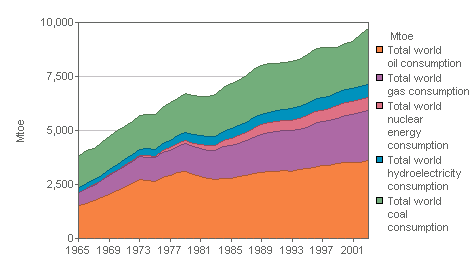
© BP
Global energy consumption, 1965-2003
|
World carbon emissions from hydrocarbon use rose by 3.8 per cent in 2003, with about half the increase accounted for by China, according BP Chief Economist Peter Davies, reported in the July 2004 issue of Ecoal. Newswatch editor Mick Kelly reports. |
|
|
© BP |
|
Global energy consumption, 1965-2003 |
|
Peter Davies was launching the latest BP Statistical Review of World Energy in the UK. The data show that global carbon emissions in 2003 stood 18 per cent above 1990 levels.
According to the Review, world primary energy consumption grew by 2.9 per cent in 2003 as a result of economic recovery. In China, energy consumption rose by 13.8 per cent, with coal consumption increasing by 15.2 per cent, as a result of strong economic growth. China is now the world’s second largest consumer of oil behind the United States.
"The challenge for China is to access global energy supplies at competitive prices and to create and apply appropriate technologies for transforming energy consumption, on which China's long term economic prosperity depends," said Byron Grote, managing director and chief financial officer of the BP Group at the launch of the report in China.
Worldwide, growth in coal consumption during 2003, at 6.9 per cent, was the second highest annual rise in this sector since 1984 and the highest during 2003 of any energy source.
Nuclear consumption fell by 2 per cent, largely as a result of a reduction in Japanese output as reactors were closed for safety checks. Renewable energy production continued to increase, with the fastest growth in the windpower and photovoltaic sectors. Biomass is the largest commercial source of renewable energy.
Further information
The full text of the
BP Statistical Review of World Energy 2004 is available
on-line, along with data files and analysis tools.